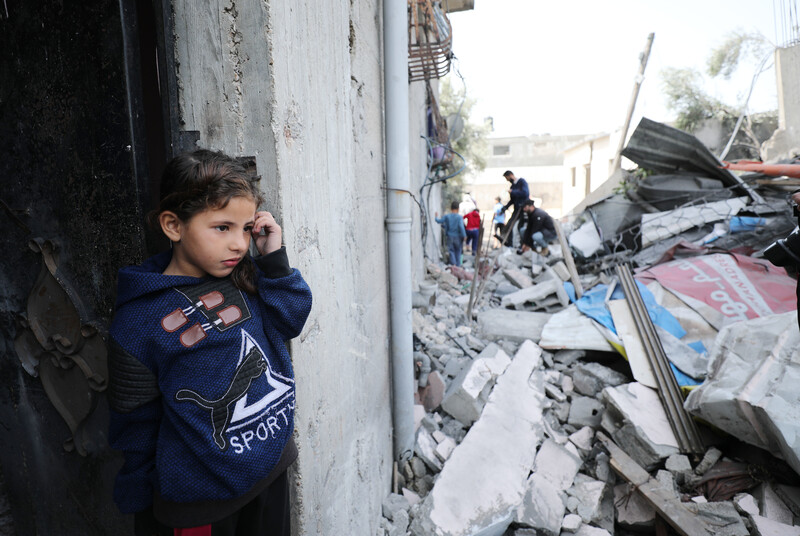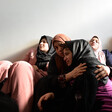The Electronic Intifada 12 May 2023

A child stands beside the remains of a building struck by Israel in Beit Hanoun, northern Gaza this week.
APA imagesPalestine’s most renowned poet Mahmoud Darwish once described Gaza as a place of “children without a childhood, old men without old age.”
Those words reverberated around my mind during Operation Cast Lead, a major Israeli attack in late 2008 and early 2009. Like many others in Gaza, I expected to be killed then.
I was working as a journalist. As I witnessed bombs rain down around me, I thought that soon I would become “collateral damage” – to use the heartless phrase of Western militaries.
There would be more attacks after Cast Lead.
The next one came in November 2012. At that time, I was working as a fixer for Al Jazeera English.
When Israel’s warplanes bombed the nearby al-Jawazat area in Gaza City, the windows in the Al Jazeera office and those of other media organizations were shattered. Many of my colleagues were hurt.
The same building would be entirely destroyed by Israel at this time two years ago. The destruction was broadcast live on TV.
Everyone with even a basic understanding of international law knew the destruction was a war crime. To Israel, it was just collateral damage.
The longest of Israel’s attacks came in 2014. During that summer, Gaza was bombed for seven consecutive weeks.
I was part of a group called Beats for Gaza then. We did our best to reach the homes of people who needed basic supplies.
I lived in constant fear of hearing that someone from our group had been killed.
Miraculously, we all survived but a few of the volunteers’ homes were damaged. The attack had a marked effect on the mental health of some members in our group.
Others had it worse. Approximately 140 families were either wiped out or lost several members during that attack.
More collateral damage.
On Tuesday this week, Israel began yet another attack on Gaza.
The operation is, according to Israel’s apologists, targeting Islamic Jihad.
When it was reported that civilians had been killed in the initial stages of the attack, an Israeli military spokesperson said, “We’re aware of some collateral and we’ll learn more as the day goes ahead.”
Living with the consequences
Palestinians have seen their families and friends killed and their homes and dreams destroyed by Israel time and again. All Palestinians can tell you about the loss they have sustained in their lives.
For Israel’s apartheid regime, this loss is merely collateral damage.
Ever since it was established in 1948, the state of Israel has never stopped inflicting collateral damage or even reduced the amount that it inflicts.
Israel has never stopped building and expanding settlements in the occupied West Bank, including East Jerusalem. It has never lifted the full siege imposed on Gaza in 2007.
It has never stopped violating human rights and international law. Despite all the death and destruction it has caused, Israel has never changed its policies.
While Israel dismisses its crimes as collateral damage, Palestinians live with their consequences. Huge numbers have injuries and disabilities due to Israeli military tactics.
Gaza’s people pay the heaviest price of all. The worsening poverty and unemployment resulting from the siege should not be dismissed as collateral damage.
Yet the siege of Gaza and the wider oppression of Palestinians continue, enabled by the “international community” and, in particular, the United States and the European Union. By directly supplying weapons to Israel – and buying Israel’s weapons – they make a mockery of human rights and other values for which they supposedly stand.
Even when it claims to be alarmed by the “excessive number” of Palestinian casualties, the most that the “international community” does is issue a report. A report that can soon be filed away and ignored.
Israel has killed approximately 4,800 people in Gaza since December 2008. Hundreds of the victims were children.
When we look beyond the numbers, we see toddlers, young people, fathers, mothers, families. We see students, nurses, teachers and more.
All of these people have been called collateral damage. That is an insult to all the beautiful people who have been killed.
It is an insult, too, to the Palestinian struggle for liberation and justice.
Worthy of love
How many people must be killed and how many homes must be reduced to rubble before the Gaza blockade is lifted? When will my people be allowed to understand the meaning of a non-militarized life?
As well as Israel’s major assaults on Gaza, there have been a number of shorter ones.
In November 2019, Israel carried out a “targeted” assassination of Baha Abu al-Ata, an Islamic Jihad commander.
His wife Asma was among the 34 Palestinians killed in that period of time. Eight of the dead were children.
The 2019 attack may have been relatively short but it was still terrifying. I was extremely worried about my niece, who was only a year old at the time.
In August last year, Israel struck Gaza again.
At least 22 Palestinian civilians were killed, including four women and 17 children. Although some of the deaths were caused by rockets from Palestinian resistance groups that fell short, Israel must be held fully responsible for the attack and its results.
Collateral damage against Palestinians is treated as something normal by the Western media.
The media adopt Israeli – and more particularly Israeli army terminology – to describe us. That must stop.
Russia has been sanctioned and boycotted over its invasion of Ukraine. Yet there is no such action against Israel.
Palestinians are resisting Israeli apartheid and colonization on their own.
I am relieved that my parents, my brother, my sister-in-law, my niece (now aged 4) and my friends in Gaza are not among the latest collateral damage.
They have come close in the recent past. Our family’s home was damaged by Israel’s bombardment of Gaza in 2021.
Still, I fear for them. Once Israel’s latest act of aggression finishes, it is inevitable that another one will take place before long.
Mahmoud Darwish called Gaza “the most beautiful, the purest and richest among us and the one most worthy of love.”
Palestinians deserve to be treated as human beings, with the same rights as everyone else. When will be deemed worthy of the world’s love?
Majed Abusalama is a writer, activist and researcher. Twitter: @MajedAbusalama


